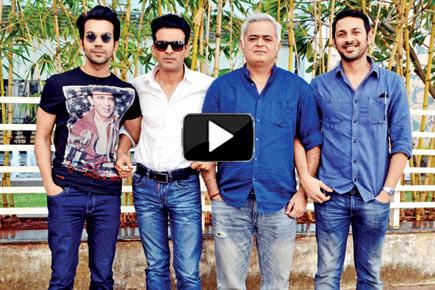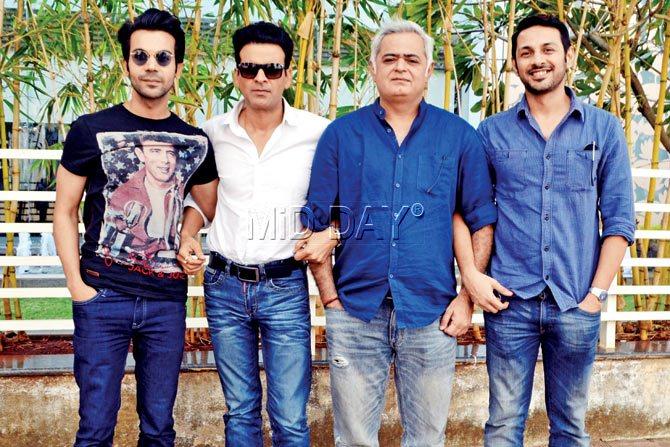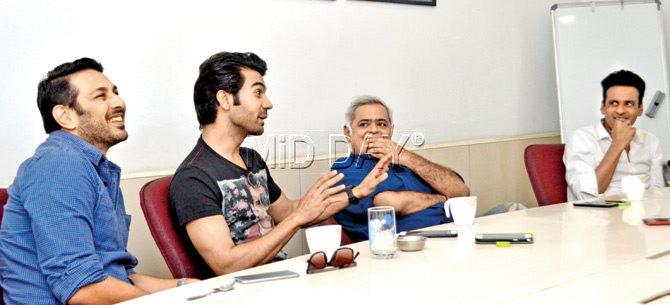Director Hansal Mehta on Indian society's growing acceptance to 'taboos' during his recent visit to mid-day's office along with his film's writer Apurva Asrani and actors Manoj Bajpayee and Rajkummar Rao

From left: Apurva Asrani, Rajkummar Rao, Hansal Mehta and Manoj Bajpayee at the mid-day office
The timing couldn't have been better. The month of February began with the Supreme Court referring a batch of curative petitions against archaic laws criminalising consensual sexual acts of Lesbian, Gay, Bisexual and Transgender (LGBT) adults in private, and will end with the release of a film on this 'taboo' topic.
ADVERTISEMENT

From left: Actors Rajkummar Rao, Manoj Bajpayee, director Hansal Mehta and writer Apurva Asrani at the mid-day office. Pic/Datta Kumbhar
The team of Hansal Mehta's ''Aligarh'', based on life of a university professor who was suspended from job for his sexual orientation, is confident about opening up a healthy discussion on the regressive Section 377 of the Indian Penal Code. In a freewheeling chat with hitlist, Hansal along with his film's writer Apurva Asrani and actors Manoj Bajpayee and Rajkummar Rao talk about the upside and downside of making a film like 'Aligarh', issues with the Censor Board and exploring non-mainstream cinema...

From left: Apurva Asrani, Rajkummar Rao, Hansal Mehta and Manoj Bajpayee at the mid-day office. Pic/Datta Kumbhar
Q. 'Aligarh' is finally getting a release. It's a good sign that such unconventional movies...
Hansal: ...It is not "finally" getting a release. It was intended to be released in February. Last year, the movie calendar was packed till December. The film was always with Eros and there was never an issue with distribution. In a nutshell, there was no struggle to release the film.
Q. Do you feel it's a privilege of sorts that a film on a sensitive topic like homosexuality found studio backing?
Hansal: Getting studio support was easy. They heard the story and didn't treat it as something not mainstream because it isn't so. I have spent a major part of my career making mainstream films and know that one needs to engage with the audience. You cannot make films in isolation. And I think they understood that.
Q. But the subject is still considered as a taboo...
Hansal: I think we have been conditioned to consider it a taboo.
Q. Don't you agree that we, as a society, are still homophobic?
Hansal: I think we are less homophobic now. There is definitely a divide and the problem is that we are not talking about it. This film aims to spark off a healthy debate.
Q. Apurva, what challenges did you face while writing the story?
Apurva: The struggle was somewhere in our heads. You meet a person who is homosexual and when you sit down with him/her, you realise you can talk to them about normal things like tea-coffee or each other's families. So, you know that it is all in your head. There was no such struggle, except what the Censor Board might think of it.
Hansal: They messed with our trailer citing that homosexuality is unconstitutional. This has hampered our promotional campaign. We could have reached a large number of people if our trailer was certified U/A. We were not fighting for the film's certification in the first place. I came out of the Censor Board and never spoke about it. But when our trailer was rated as 'A', I got really angry.
Q. Don't you think your war of words with Board chief Pahlaj Nihalani over the certification helped create more curiosity around the film?
Hansal: That is incidental. I want the trailer and not us to be seen.
Apurva: Many people are not on social media. How will the trailer reach them?
Q. Hansal, you have always got yourself in trouble with the Censor Board...
Hansal: Actually, I have had less trouble. The Censor Board has always picked really silly issues with my films. I don't know why they always find me to expose their intellect. In 'Shahid' (2013), they removed Shivaji Maharaj's name! Even in this film, they asked for a cut that is downright silly. In one of the scenes, Manoj is shown sleeping in court and they felt it was contempt of court. So, I fought with them and they said reduce the (duration of) sleeping. How do I reduce the sleeping?
Q. There are many more things done in court...
Hansal: Sunny Deol has made a career out of it (everyone laughs).
Q. What kind of research went into making the film and what kind of debates are you expecting to open up after its release?
Apurva: The day we screened the film in Delhi for Shashi Tharoor, the Supreme Court took the decision to refer Section 377 to a higher bench. So, our film has got associated with the debate. But the research went beyond 377; it focused on the character's life and the injustice that happened in a higher education institute that's supposed to nurture progressive ideas among students.
Hansal: The fight is beyond 377. Someone barges into your room with a camera and you get into trouble! Article 21 of the Indian Constitution says you are entitled to right to privacy and dignity.
Q. Manoj, did you have second thoughts about doing a film on such a sensitive subject?
Manoj: Not even for a second. Taking up the role was not difficult because I have many homosexual friends. My education has been such that I wasn't taught to judge someone by their sexuality. Looking at the script, I realised that his life was engrossing. This was a great opportunity for me to do completely opposite of whatever I have done so far, thanks to Hansal. No other director would have come to me with the role after I played Sardar Khan in 'Gangs of Wasseypur' (2012).
Q. What do you think of Rajkummar, who has been taking up unconventional roles?
Manoj: What I like about him is he won't compromise when it comes to role selection. He is stubborn about what he wants. He has loads of options to choose from and make money and be happy. Kudos to him for saying no to money and yes to good roles.
Q. Did you have that vision at his age?
Manoj: Yes. After Bhiku (his role in 'Satya'), I was flooded with offers. I used to stay in a two-bedroom house then and people used to wait to meet me with scripts. Some were ready with bags full of cash as signing amount. To say no to that kind of money after many years of no money and no food was tough. People used to say that I consider myself as Amitabh Bachchan. So, I was only making enemies.
Q. So, Rajkummar, is it becoming difficult for you to say no to filmmakers because then your equation with them will change?
Rajkummar: I don't have to prove anything to anybody. I fell in love with the craft of acting and want to give my best. That's my achievement. I am not in any rat race. There's no insecurity if someone my age is making more money and is more famous. I am happy with my work and my journey. I will explore different things in my own way. I won't copy and be part of a herd.
Q. So are you also making enemies?
Rajkummar: It's tough to say no. People come up with scripts they are confident about, but if I think I don't fit the role, I say no. Some take it personally.
 Subscribe today by clicking the link and stay updated with the latest news!" Click here!
Subscribe today by clicking the link and stay updated with the latest news!" Click here!






